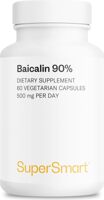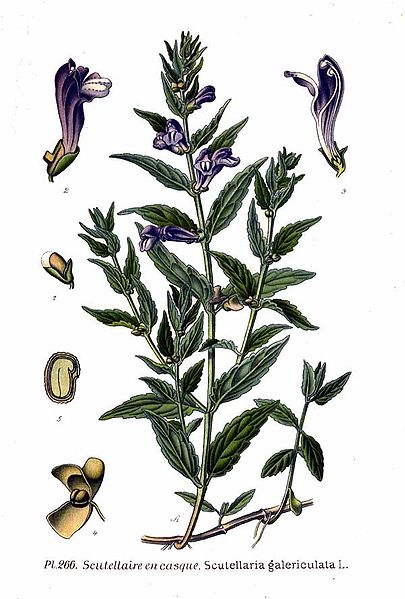There are two different herbs that go by the name scullcap: American scullcap (Scutellaria lateriflora) and Chinese skullcap (Scutellaria baicalensis). It's also commonly known as skullcap.
Each type of scullcap serves a different purpose and they are not interchangeable. Here are some main differences:[1]
| American scullcap | Chinese scullcap |
|---|---|
| Native to North America but grown in Europe and elsewhere | Native to China, it's also grown in parts of Russia |
| It has many branches | It has one stem |
| The flowers are helmut-like | Bright purple flowers |
| Forms: powdered, liquid, and capsules | Forms: powdered |
Uses
American scullcap has been around for more than 200 years. Its leaves have been used for medicinal purposes, including treatment for insomnia, cholesterol, epilepsy, convulsions, and anxiety. According to NYU Langone Medical Center, "skullcap was believed to function as an herbal sedative."
Chinese scullcap has been used in more studies than its American cousin. Its root, which is medicinal, has been used to treat allergies, infections, inflammation, cancer, and headaches. It might also be useful for treating fungi, viruses, diabetes and high blood pressure[1, 2]
Does scullcap work
There isn't enough current research to back up claims of American scullcap'seffectiveness. Studies on Chinese scullcap were conducted on animals, so it's unclear if humans would reap the same benefits.
Recommended Dosage
The typical dose for Chinese skullcap is 3g to 9g per day. It's usually consumed as part of an herbal combination. An ordinary dose for American skullcap is 1g to 2g, three times per day. It's usually taken in combination with other herbal sedatives, including valerian and passionflower.[3, 4]
Drug interactions
Both types of scullcap may interact with some medications, potentially altering their effects. For example, if you're taking sedatives, both types may increase the medication's intensity. Also, Chinese scullcap may alter the effects of diabetes medication. If you are taking any medication, consult your health care provider before using this product and find out how any new medication, whether over-the-counter or prescribed, will be affected by the plant.
Side effects and warnings?
High doses of American scullcap tincture may cause side effects, including confusion, irregular heartbeat, giddiness, seizures, twitching, and stupor.
Do not take Chinese scullcap if you have spleen or stomach problems.
Do not take either type of scullcap if you are pregnant or breastfeeding.
Chinese skullcap may lower your blood sugar.
References
University of Maryland Medical Center; "Skullcap;" Reviewed 2011
WebMD.com; "Skullcap;" Find a Vitamin or Supplement"
NYU Langone Medical Center; "Skullcap;" Reviewed 2013
NYU Langone Medical Center; "Chinese Skullcap;" Reviewed 2013
Scullcap News on PricePlow
-
Feb 11, 2025 
Product News
SuperSmart Baicalin has new variations: Category: Scullcap -
Feb 10, 2025 
Product News
SuperSmart Baicalin was created.
Category: Scullcap -
Jan 11, 2024 
Product News
Nutricost Baikal Skullcap was created.
Category: Scullcap
Sign up for future Scullcap news!
Click the button below to sign up for future Scullcap news, deals, coupons, and reviews!
